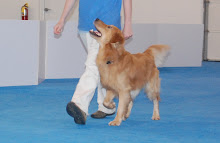Types of class: Typically, people know what they want when they're signing up for classes, and often this is the right option for the student. Agility. Puppy Class. Basic Manners. Sometimes it is not. It's important to find out the goals of the student and what they are most wanting to learn or modify to be sure the class is a good match for reaching those goals It's also important for the instructor to have a referral network in place for situations where a type of class is not offered. Family with a young puppy wanting some training? We direct them to puppy class. Family with 9 month old puppy, wanting to get into puppy socialization class? They go to basic manners, the puppy is aged out of basic manners class.
Group v Private: Some students do better with smaller group sizes, some do well in a larger group. Group classes are typically less expensive for the student, the X number of weeks helps the student to commit to class for a period of time, and the social aspects can be enjoyed. But group classes are not always appropriate for situations where there is a lot of individual help needed, such as behavior problem solving or home management challenges. Some learning styles do better with a private lesson and the complete attention of the instructor.
Teaching Style: Instructors set out classes and lessons in different ways. All good instructors should be able to modify their teaching style for a variety of learners, but not all instructors are the best option for all students. It's important to see how a student learns well, and how they do not. We need to be setting up sessions that are just as great for the humans as they are for the dogs. Some people need notes in writing. Some need to see things in action. Some have to practice. Some need more feedback, and some need just a start and can go along.
And so not only do we need to consider all these pieces (and more) when talking with students and potential students, but we have to efficiently filter them into the right environment for most success. This week I'm re-thinking how we're doing some of this and how we may need to modify our current process so that we can better help students.
----------------
Me? I like group classes. I like just blending in and not having to come up with my specific goals and problem areas. It's great to work around other dogs and people and to see how other people teach classes and how the students respond in those environments. But it's hard to commit to group classes (x weeks in a row, at the same time) or to find one where we will be learning enough/getting enough out of the class for our money and time's worth (...typically an hour some drive!). So, recognizing the importance of value (time and money!), for the last few years we have mostly done private lessons only for obedience and agility. Our specific problems and challenge areas are addressed. The instructors give us feedback and we have their complete attention. I go home with things to work on and after we have accomplished those pieces, we go back to class. In group classes, I would sometimes not do my homework. Meaning less progress in class. Meaning less learning for our money and time.
It's a challenge to work things out just right!




No comments:
Post a Comment